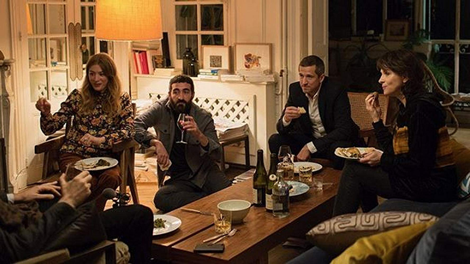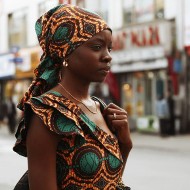 Olivier Assayas portrays the complex and somewhat devious relationships of a group of Parisian literary types, in a film that poses questions about traditional culture, and the digital world that is threatening to supplant it.
Olivier Assayas portrays the complex and somewhat devious relationships of a group of Parisian literary types, in a film that poses questions about traditional culture, and the digital world that is threatening to supplant it.
The latest offering from prolific French director Olivier Assayas bears the ironic title Non-Fiction, even though it is a fictional portrait of intertwined relationships. It opens with a meeting between a scruffy middle-aged novelist, Léonard Spiegel, played by Vincent Macaigne, and his editor, Alain Danielson, an erudite, genial intellectual played by Guillaume Canet. Alain’s company has published all of Léonard’s novels up until now, but he’s not too happy with the latest one, which he considers just more of the same. Léonard has a tendency of putting actual events and people from his personal life, and his sexual affairs in particular, into his novels, and often in transparent ways. His latest is no exception, but now this habit is getting negative attention on social media. Alain spends some time trying to guess who the lover of Léonard’s central character in the new novel is in real life. It is only until the very end of their talk, during which they’ve walked about Paris and had lunch, that Léonard realizes Alain has decided not to publish the book. This beginning sequence is a foretaste of the film’s marvelous feel for multifaceted conversations, taking place at home or in public, and often during delicious meals, indicating among other things the characters’ privileged economic status.
Juliette Binoche plays Alain’s wife Selena, an accomplished actress currently starring in a TV cop show titled Collusion. Léonard is also married, to a progressive activist named Valérie, played by comedian and stage actress Nora Hamzawi. Valérie is impatient with her husband’s moodiness and pessimism, and Léonard’s annoying practice of depicting his affairs in his books doesn’t help. He insists that he doesn’t write “autobiographical” fiction, but this theme points up a general feeling that truth and falsehood, fiction and non-, are getting hard to tell apart nowadays.
In the context of the publishing world, the film also features friendly debates about the digital revolution, how it affects literary culture, and especially the reading of books, and what compromises may have to be made to adapt to this brave new online world. Alain has hired a young woman named Laure, played by Christa Théret, to manage the publishing company’s transition to digital formats, what we usually call e-books. Laure is a true believer in the internet revolution; together on a promotional tour, she scoffs at Alain’s attempts to defend the need for a physical book. In fact, he’s trying to straddle two points of view: in talk with his wife and friends, he often takes the part of the digital future against their skepticism.
One of the reasons I love Assayas’s films is that he blends his ideas seamlessly with his sense of personal drama, or in this case, comedy. We figure out fairly soon that almost all the major characters are cheating on or sleeping with one another. The talk is adult and respectful, no one shouts, and Non-Fiction is so charming and funny in its low-key way, that you may not notice at first how poorly the characters treat each other. The thin veneer of civilized life draped over their relationships is reflected in the debates between an outmoded past and a disturbing technological future. The actual French title translates as “Double Lives” which is a more accurate description of this subtle movie than Non-Fiction, the title chosen for release in English-speaking countries, but the idea that so-called “real-life” has become less and less believable is certainly a cogent one.
All the actors are splendid, with the stand-out being Juliette Binoche, relishing a part where she can spoof her own art film image. I was smiling and chuckling throughout this mellow comedy of ideas—Assayas has done it again.
This is another example of a film appearing on a local screen for a week, and then vanishing. Why this happens so often to movies I like is a frustrating, perhaps rhetorical question, but oddly, it’s related to some of the ideas in this picture. In a cinematic market where the big money-makers are based on comic books, is there still a place for art? Non-Fiction is now available streaming and on DVD.

A new film from the West African nation of Ivory Coast presents an intriguing allegory about power and its misuse. Night of the Kings,...

The well-crafted drama Mother of George takes place in one of those small communities from overseas transplanted into urban American society, in this case...

Steven Soderbergh’s scary little genre piece features Claire Foy as a woman fleeing a stalker who gets tricked into committing herself to a mental...